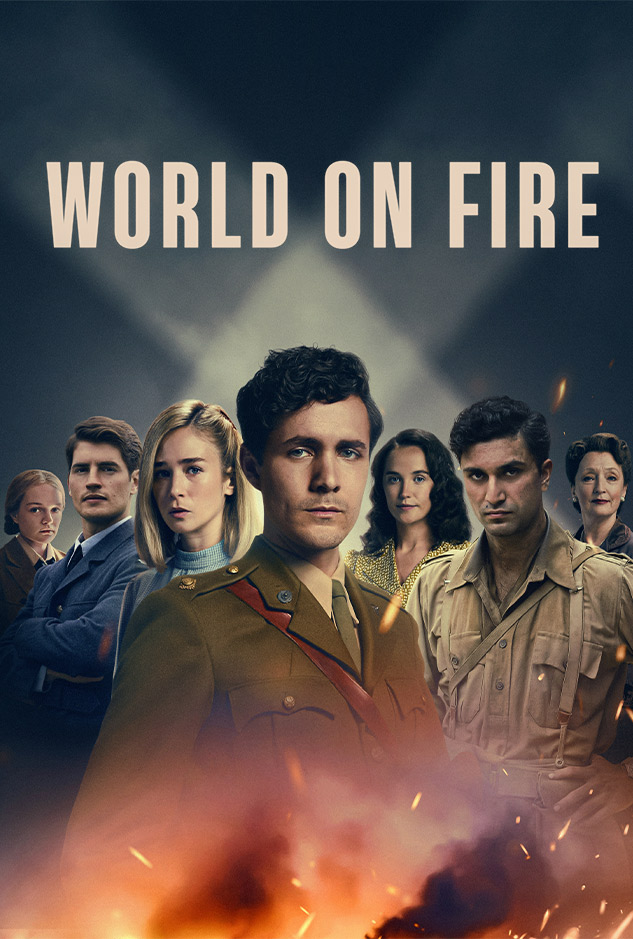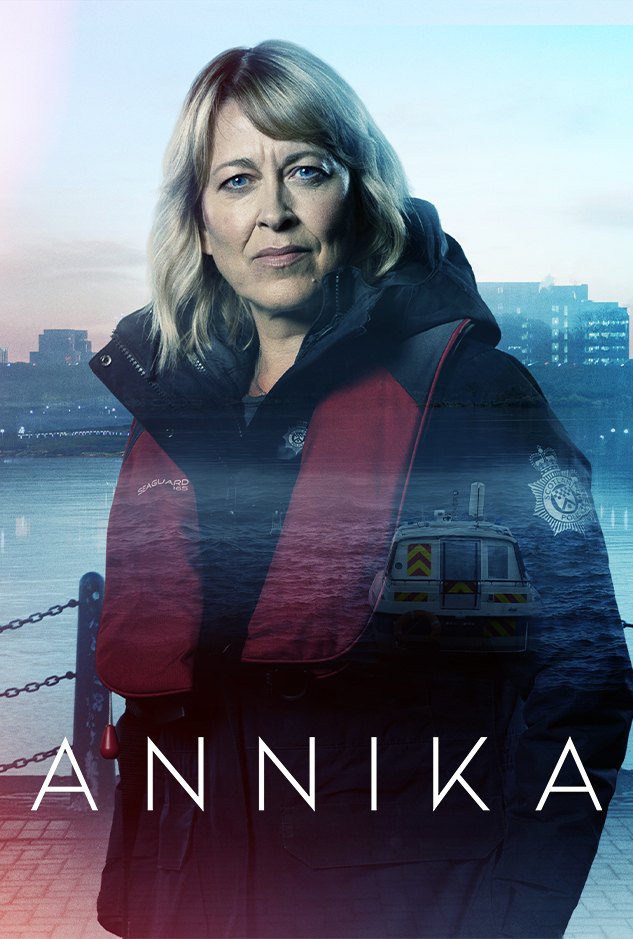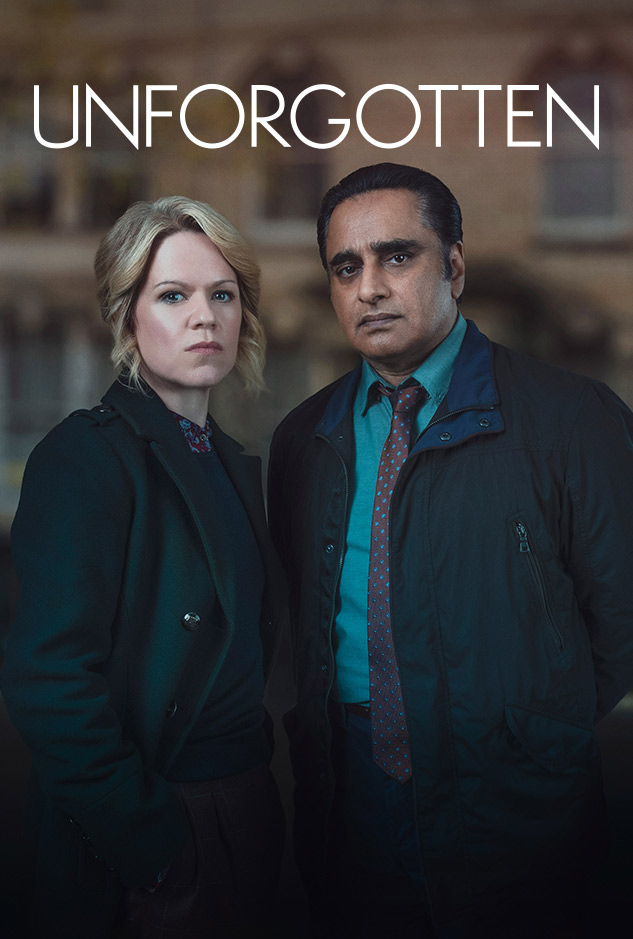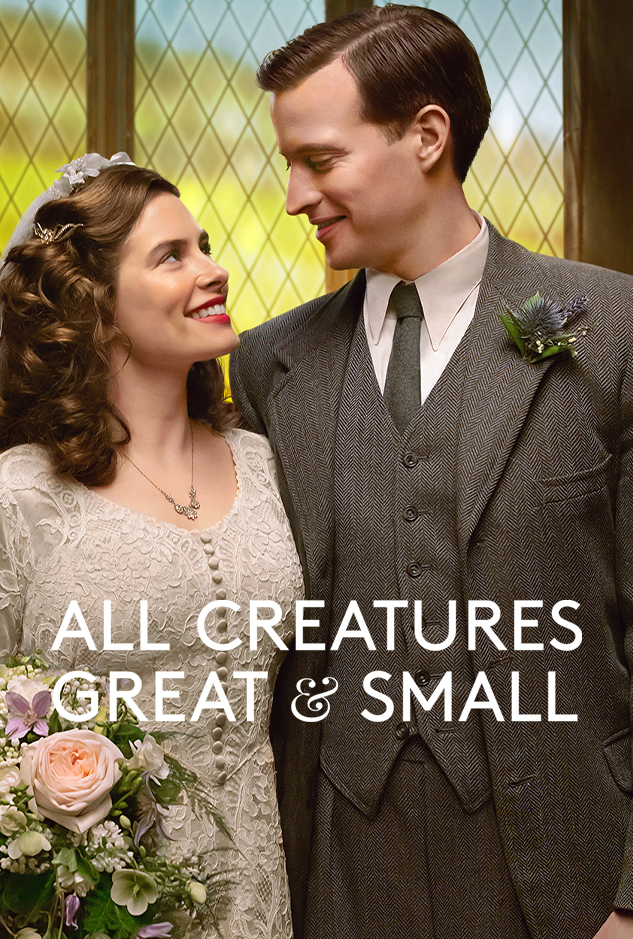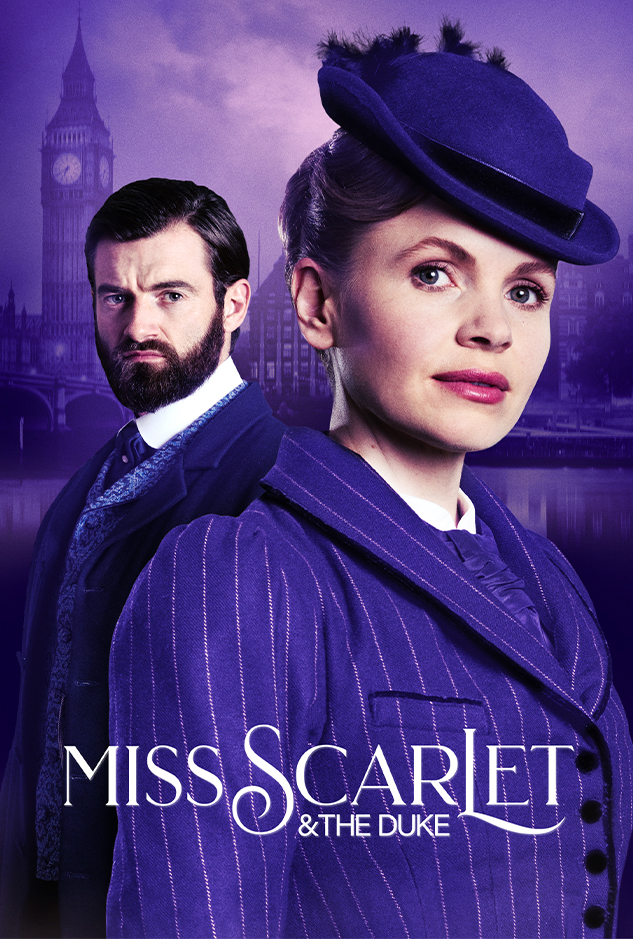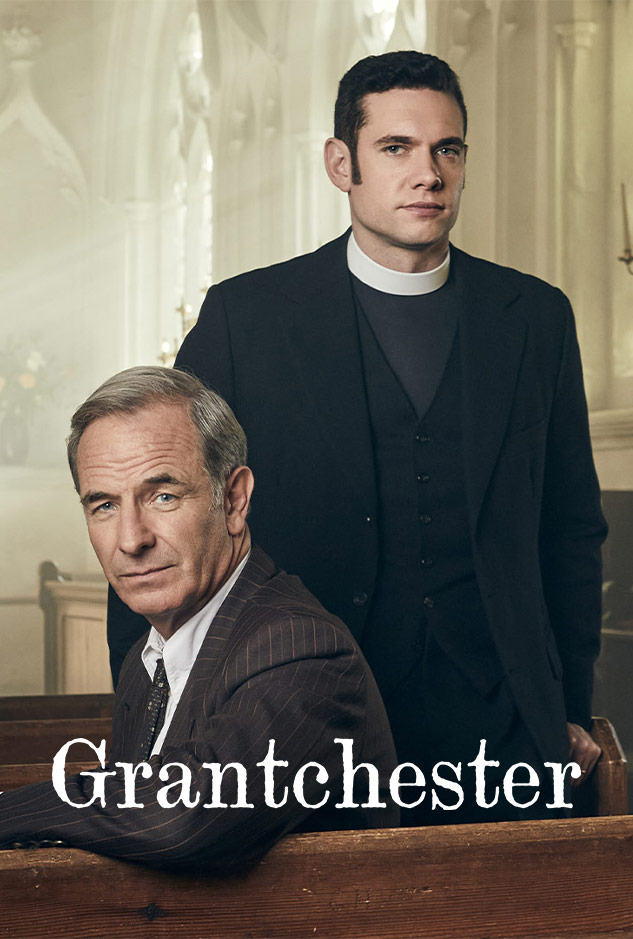Interview: Miss Scarlet and The Duke’s Creator Rachael New
With Season 2 of Miss Scarlet and The Duke now in production, there’s never been a better time to watch Season 1 all over again and catch up on London’s greatest investigator with creator and showrunner Rachael New! Find out what fires the spark between Eliza and William, why he’s nicknamed The Duke, what we can expect in Season 2, and much more. Binge all six episodes of Season 1 with PBS Passport, an added member benefit.
Some of our favorite detectives work in pairs. What is it about Eliza and William that makes them such a great pair?
I think it’s probably because they are so different. It’s that magical combination of chalk and cheese. They’re kind of like family, like siblings, really, and because you’re stuck with some of your family in life whether you like it or not, that just makes things funnier. I think, as a pairing, they’ve got that bond. They’ve got the humor because they annoy each other. They’ve got something in common because they’re in the same world, and also I think there’s a little bubbling attraction there, as well. They’re sort of magnets to each other—they’re constantly trying to get away from each other, but just get back together again.
How did you conceive of the show and its characters? Did you have any specific inspirations?
I love historical fiction. I’ve said this before, but I’m a big Philippa Gregory fan and I love the novels where you have a really aggressive, smart, independent woman thrown in at a time when women had little to no rights, so they had to work out how to survive by operating within the limits of their time. I think that’s really interesting, so I knew I wanted a protagonist like that, a progressive woman in a time which was going to be tricky for her.
I’m really interested in the Victorian age, anyway. My niece had written a dissertation about women and the asylums in the late 19th century, and how an inconvenient wife could be thrown in by her husband or her brother and, once in there, would be stripped of their humanity and retaught how to be this demure lady, essentially—how to be ladylike, to be a wife and mother. If you were put into the asylum, you had to wait for one of your male relatives to sign you out again. I just thought that it wasn’t that long ago, so that started bubbling something. I’ve written a lot of detective shows as well, and my career seemed to be going into that niche anyway, because I really enjoy winding, weaving of that sort of detective spying. So all of these things came together.
And I love Jane Austen’s Elizabeth Bennet. Obviously, I love Mr. Darcy—I would say the Duke is a little bit more Knightley than Darcy. I loved Moonlighting as a kid; that’s probably influenced me quite a lot, really, in this show. So it’s not a straightforward answer, but there’s an awful lot of my formative years, the things that have influenced me, in this. Just the things I really loved watching, films I watched growing up, Gone with the Wind. The other day, I was thinking about Moses and how he reminds me of all the old spaghetti westerns I used to watch with my dad, that kind of Clint Eastwood film like Man with No Name and The Outlaw Josey Wales, which was one of my favorite films growing up. Because as well as Eliza and the Duke, the supporting characters like Moses and Ivy have all been in my head for a very long time.
Is there any Eliza in you?
Yes, there is. I think I have her impatience, although I tried to become more patient as I got older. I’ve had my fair share of being patronized by men over the years. And I think I’m pretty determined. I grew up with brothers—I’ve got an older sister, thank goodness, but my two younger siblings were brothers—and when I was a little girl and we used to sit around the table taking turns to talk about our day, my brothers used to yawn and do [exaggerated yawning motion] all this when it got to be my turn. So I remember sitting there from an early age, just thinking, “I’m going to get back at you at some point.” They are lovely, my brothers. So I was a bit of a tomboy growing up, as well. Yes, there is a lot of me in Eliza.
However, since Kate Phillips has come on board, she’s front and center of my mind when I think of Eliza, now…she brought something of her own to this role. As a writer, you have these characters in your head, and then you sort of have to give away your babies, as it were, to whoever’s going to embody them—which I think is a good thing, because Kate and Stuart have both brought something different. They’ve taken their own interpretation. I can’t really put it into words, but whatever they’ve done, I love it. So initially me, but I think of Kate Phillips as Eliza now.
Miss Scarlet and The Duke‘s setting in Victorian London has a rich historic feel, but there’s also a real contemporary spirit to the show. How do you walk that line? And what makes it feel so contemporary—is it their banter and their relationship, or her character, who has so much pluck and sass?
Well firstly, I wanted each episode to have some sort of flavor at the time—you’ve got women’s rights, the death photography, the whole thing about coming out and homosexuality—so I wanted people to be able to reflect on that. But just as importantly, I wanted it to be really fun, really entertaining, and for men and women and children to watch it. I didn’t want it to be a lecture in women’s rights, as it were. When I’m writing the dialogue, I’ve always got an eye on the fun. I want to try and keep the dialogue as close to how people would have spoken back then, but it’s definitely got a modern twist on it because I want it to be entertaining and for people to engage in it. I think it would be a huge turn off if I wrote the characters as they probably would have spoken. So it’s keeping that historical context, but with that little modern flavor and fun.
It’s within the banter that you’ve got an awful lot of things bubbling between them. You don’t want to write a scene where the dialogue is telling the audience what the scene is about; you have to hide that a little bit, whether it’s flirting or joking or being angry. It’s like if my husband and I have an argument, it can start off with the washing up, and then one of us will go nuclear and start saying stuff about each other’s families. They’re arguing about stuff where actually there’s more things going on with a deeper meaning.
It’s a bit like a dance when I’m writing their dialogue. It’s very much about well he’s got the upper hand, now she’s got the upper hand. She is plucky and she is feisty—she won’t let him have the last word. So it’s got that musicality to it.
What is the Duke’s most infuriating quality, and what’s his most redeeming quality?
His most infuriating quality probably is his insecurity, because he wants to be seen as the most important man in the room. I think he’s had a life, as an adult, of being the most important man in the room. Eliza dilutes that. She’s known him for a very long time and she just won’t put up with that kind of huff and puff. Because his background, he’s come from the workhouse and he wants to get as high as he possibly can. That’s a bit of a chip on his shoulder, I think.
His most endearing quality is that he is really, I think, a decent man. He’s a man of his time—he’s never going to think it’s okay for a woman to be a private detective. But he’s loyal, and if she finds herself with any problems, he would come to her and try and help her. So yeah, I think he has got a good heart. He is a decent man.
How about Eliza? What’s her most infuriating quality and her most endearing quality?
Eliza’s most infuriating quality is probably her impatience. I think she jumps into things too quickly without thinking them through. Our lovely director, Declan O’Dwyer, who I have to give a shout out because he was incredible in this process—he more than just took the story off the page, he just had so much magic in his vision for it—he describes Eliza as a kind of female Indiana Jones, who kind of stumbles into these situations and generally triumphs, but not in the way that she’s planning to. It’s a kind of byproduct. I think that’s because she is so impatient and she’s just so sort of, “No, I should be allowed to do this.” There’s a lot of injustice there with her. So she could probably take a step back a bit.
I think her most endearing quality is that she is unfailingly loyal, as well. If Duke or one of her friends were in trouble, she would absolutely put herself on the line for them. So I think they’re both cut from the same cloth—they’ve just both had a very different starting life, and are both very different people.
To go back to their relationship, the Duke is very much a mirror to Eliza. They’re roughly the same age, and I think that’s why they clash, as well, because she looks at him and thinks, “I want what you’ve got, and sometimes I feel you don’t appreciate what you’ve got.” Whereas he would look at her and think, “You wouldn’t be able to handle this job.” He’s so jaded because he’s been a police officer for a very long time in the guts of the city of London. It probably has been pretty horrible most of the time. So that’s where they clash, and that’s where the roots of her injustice are fired, when she just sort of looks at him and thinks, “That’s so unfair. I want to be able to have doors open like you have.”
Can you talk about the character of Moses and the biases he would have contended with in Victorian London? Did you work with Ansu Kabia, the actor playing Moses, at all on that?
What was really important to me when I was writing this was that they’re outsiders. Rupert is a gay man living in Victorian London. To a lesser extent, the Duke has got his own obstacles. And then you’ve got Moses who, no matter what a woman was going through, as a Black man living in Victorian London, you would have had a really, really difficult time. I thought that was very interesting. This is a show about a woman trying to stay in the game of a man’s world. And it really was a man’s world, a white man’s world. In order for me to really hit that with Eliza, it demonstrated it perfectly to have these two other men in her life that also had their own struggles.
Ansu is just extraordinary as an actor, and a lovely, lovely man. He would want to know everything about Moses and where he came from. What was really nice was an interview I saw with him where he said that Moses, he believed, looked at Eliza like she reminded him of his little sister, and that’s why they connect. I hadn’t ever said this to Ansu, and I thought it was so lovely that he’d given it that kind of thought. Because backstories are funny things—they are really helpful to some actors, but sometimes it’s almost better to hand the role over and go, “Look, here are the bare bones of what I’m saying this person is like.” Hopefully, if it’s well written enough, the actor gets who that person is on the page as well. But when an actor starts almost coming up with the backstory as well, I think that’s really exciting, because that shows how invested they are in it. So that was very much how Ansu saw Moses. Like I said earlier, Moses to me is that sort of “man with no name.” In fact, they even dressed him in a slightly western way, if you look at his costume, the hats and the way he’s dressed. It’d be great to get some spurs on his boots, but I think that might be a bit too much.
In an Instagram Live with @masterpiecepbs, Stuart and Kate revealed why William is called the Duke. Did we learn that in Season One, and I just missed it?
No, no. I’m a great believer in not explaining everything. But yeah, his nickname is from the Duke of Wellington, who was a big war hero, kind of a drinker, gambler, womanizer, leader of men. The Duke is an alpha male—there’s no spoilers there—and there couldn’t get any more of a male kind of place to be than Scotland Yard in the 19th century. But Eliza never, ever calls him that. She always calls him William. She’s the only one that does.
What can you tell us about the title sequence, which seems rich with references and clues? And the theme music, which has a kind of propulsive energy?
The title sequence was basically based on how, as a detective, you have to look at the crime scene and then take your steps backwards to see the clues of the crime. Everything is going backwards. So if you look at it, it’s about the money. The opening music is quite slick, quite modern, and then the end credit music is a bit more of its time, a bit western-y as well, which we really like. It’s got a bit of a western twang to it. We had such a great music company we worked with.
You mentioned that each episode of Season 1 has an element of the Victorian world, whether it’s the music hall or the death photography. Will any interesting Victoriana feature in Season 2 of Miss Scarlet and The Duke?
I think so. An area I’d like to explore a bit more are the medicinal remedies that were pedaled on the streets, which were essentially sugared water. If you Google “Victorian remedies,” it’s just astonishing how many companies were out there claiming a magical elixir that could do all sorts of stuff. I find it really interesting, and we’ll be exploring that. Because I’m a mad Dickens fan, we’ll look at what it was to be almost a superstar in the Victorian age with a character that it isn’t quite Dickens, but is based closely on him. The reality is that Victorian London was pretty grim—poverty was terrible and people had a very miserable time. But people aren’t going to want to watch that; it’s an entertaining show. So there’s that delicate balance between historical context, and fun and action and adventure, as well.
What can fans look forward to in Season 2 of Miss Scarlet and The Duke?
More of the same, but probably a bit more fun…I’m really looking forward to this season even more than Season 1 because I know what works—I know what people have loved: focusing on the fun. If you look through Twitter, it’s astonishing the amount of love there is for the show. I’m not sure many fans have mentioned the detective stories, and that’s the stuff you labor over, so that’s been interesting. But the same premise will be there, which is the engine of the show: a woman in a man’s world, trying to stay in the game. Yes, there will always be a crime of the week, but the most important aspect of the show is what those crimes throw up to our main characters—the problems, the dilemmas, the obstacles. I think that’s what people have invested in. They’ve invested in our core cast of characters which, as a writer, is all you want. That’s all you can ask of people.









